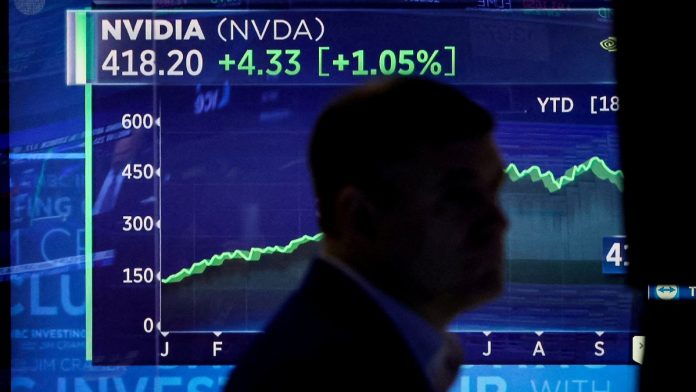The tension on the stock markets is increasing. Stock market darling Nvidia presents figures in the evening. The IT company has made a name for itself primarily for the development of high-performance chips for AI applications. After the price increase of more than 40 percent since the beginning of the year, the share price has fallen enormously. ntv.de talks to stock podcaster and best-selling author Noah Leidinger about Nvidia's pursuers and opportunities for late bloomers to get into the AI boom.
ntv.de: Nvidia has replaced Tesla as the most traded stock on Wall Street. The hype surrounding Nvidia is slowly starting to scare stock market investors. What justifies this fabulous run?
Noah Leidinger: There is a crucial difference between Nvidia and Tesla. Tesla has also increased in value incredibly in recent years. But if you look at the price-earnings ratio, Tesla shares were also very expensive at times with a valuation of 200. Completely absurd for a car manufacturer. At Nvidia, the basis for value is primarily economic development. Nvidia has grown enormously in business. Before the AI boom, sales growth was 50 percent, this year it is expected to be more than 100 percent. The gross margin on the chips is over 70 percent. This is very high for a hardware product.
What is Nvidia’s unique selling point?
Nvidia's chips are currently the best for training AI models. They have enormous computing power. All major technology companies are currently looking at AI and how they can develop the next artificial intelligence that can solve problems even better. That's exactly why these companies need Nvidia's chips. Demand is so high that Nvidia has strong pricing power. Nvidia has also developed special software on which many of the AI algorithms that developers use are based. This software is called CUDA and only works with Nvidia chips.
Speculative bubbles also arise in such hypes. How big is the risk that Nvidia will no longer be able to meet its high expectations?
The air is getting thinner, that's a risk. A company with such high margins attracts competition. There are strong chip companies that don't yet have a competitive product but are working hard on it. Sam Altman, the founder and CEO of Open AI, is currently trying to raise $7,000 billion for his chip project. That's about three times as much money as all listed companies in Germany are worth combined. He wants to use it to build factories. The Japanese technology investor Softbank is trying to start a similar project and would like to raise $100 billion for it. There is an enormous amount of money in the market. In addition, in the long term there is of course the risk that technologies will change, keyword quantum computers. In five or ten years this may be the new hot technology. Quantum computers do not need classical chips and are potentially significantly better.
Nvidia's pursuers also include AMD Advanced Micro Devices. One reads that the chip manufacturer is almost as advanced as Nvidia. Is that correct?


Noah Leidinger is the podcast host of “Without Stocks Will Be Hard” – one of the largest stock podcasts in Germany
I would not say that. The big companies that are at the forefront of the hype tend to use chips from Nvidia. This is also due to the connection with the CUDA software. In addition, Nvidia cannot supply as many chips as are demanded. Even if AMD follows suit, there is limited production capacity, demand would likely still be higher than supply. But of course, in the long term AMD is one of the big competitors that can play a part. But chips aren't just about the technology. Production must be massively expanded in the next few years. High-end chips are extremely difficult to produce. There are only a few companies that can supply the machines or chemicals for this.
That sounds like an up in the air. The stock has risen 40 percent this year alone. Should you still jump on the bandwagon?
That depends on what you expect from the industry. Banks, analysts and funds are looking at the shares very closely; they have priced in very high expectations. The stock market is currently expecting this hype to continue for a few years. Do you believe that or not? What do you know about this market? Why do you think you can assess this better than bankers at Goldman Sachs who deal with it all day? You should answer these questions for yourself before investing. Basically, you always have to be careful with such hyped stocks.
Let’s take another look at the industry as a whole. Would TSMC or ASML be an alternative for late bloomers in the AI boom?
They are active in various areas of the chip industry. ASML produces the chip production machines that Nvidia also needs. This means that they are riding the AI wave, but are not competitors. It is similar with TSMC, which in turn builds chip factories that then produce the chips that Nvidia has designed. If you go one step further, there are also strange companies, for example Modine. They produce cooling systems that cool all servers and data centers. They also increased by 200 percent last year. But you always have to keep in mind that at Nvidia, a very large part of the profits currently come from the AI chip business. These companies also benefit from this, but only with a part of their business. Accordingly, they also grow much more slowly. So just comparing the price-earnings ratios of TSMC and NVIDIA and then buying TSMC because it is cheaper would be a fallacy.
How can you benefit from the ongoing AI boom if you don't want to invest in individual stocks?
Many investors invest in broadly diversified ETFs, for example in the MSCI World ETF or the S&P 500 ETF. They probably always look a little wistfully at the incredible price development of individual stocks. However, you should keep in mind that Nvidia already has a fairly relevant share in the portfolio. This means that investors participate indirectly in developments through ETFs.
How will the AI boom continue?
There are many companies that use AI and thereby become more efficient or whose product is improved as a result. They also benefit. There is Adobe, for example. The video editing program already has many AI tools built into it that make the work easier. The same goes for language learning apps like Duolingo, which are working better and better thanks to AI. IT consultants such as IBM, Infosys and Wipro benefit in the same way. Many medium-sized companies ask how artificial intelligence can be installed in their companies and commission such consultants.
The AI boom doesn't just have one winning side. If you don't look at the stocks, you can see that more and more companies are cutting jobs. What do you think about it?
I think this is a topic that everyone should urgently address. The individual industries are affected differently. You can't easily replace a hairdresser with a robot. But programmers do. Today one person can do the work of ten. Jobs will disappear. But I would generally assume that through AI we will see more innovations in the economy and new fields of work will develop where human labor will again be in demand. This was also the case with other technological breakthroughs. The strongest combination is still man and machine.
Diana Dittmer spoke to Noah Leidinger
Disclaimer: The interview is for informational purposes only. It does not constitute an offer or solicitation to buy or sell any securities or investment funds.


